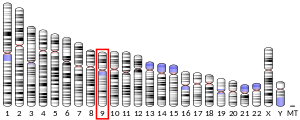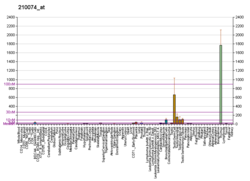Cathepsin L2
Appearance
Cathepsin L2 (EC 3.4.22.43, also known as cathepsin V or cathepsin U) is a protein encoded in humans by the CTSV gene.[5][6][7][8]
The protein is a human cysteine cathepsin, a lysosomal cysteine protease with endopeptidase activity.
The protein is a member of the papain-like protease family (MEROPS family C1), a lysosomal cysteine protease with endopeptidase activity. It may play an important role in corneal physiology. This gene is expressed in colorectal and breast carcinomas but not in normal colon, mammary gland, or peritumoral tissues, suggesting a possible role for this gene in tumor processes.
Clinical significance
[edit]Cathepsin L2 may play a role in the pathogenesis of keratoconus.[9]
References
[edit]- ^ a b c GRCh38: Ensembl release 89: ENSG00000136943 – Ensembl, May 2017
- ^ a b c GRCm38: Ensembl release 89: ENSMUSG00000021477 – Ensembl, May 2017
- ^ "Human PubMed Reference:". National Center for Biotechnology Information, U.S. National Library of Medicine.
- ^ "Mouse PubMed Reference:". National Center for Biotechnology Information, U.S. National Library of Medicine.
- ^ "Entrez Gene: CTSL2 cathepsin L2".
- ^ Brömme D, Li Z, Barnes M, Mehler E (February 1999). "Human cathepsin V functional expression, tissue distribution, electrostatic surface potential, enzymatic characterization, and chromosomal localization". Biochemistry. 38 (8): 2377–85. doi:10.1021/bi982175f. PMID 10029531.
- ^ Adachi W, Kawamoto S, Ohno I, Nishida K, Kinoshita S, Matsubara K, Okubo K (September 1998). "Isolation and characterization of human cathepsin V: a major proteinase in corneal epithelium". Investigative Ophthalmology & Visual Science. 39 (10): 1789–96. PMID 9727401.
- ^ Santamaría I, Velasco G, Cazorla M, Fueyo A, Campo E, López-Otín C (April 1998). "Cathepsin L2, a novel human cysteine proteinase produced by breast and colorectal carcinomas". Cancer Research. 58 (8): 1624–30. PMID 9563472.
- ^ Kenney MC, Chwa M, Atilano SR, Tran A, Carballo M, Saghizadeh M, Vasiliou V, Adachi W, Brown DJ (2005). "Increased levels of catalase and cathepsin V/L2 but decreased TIMP-1 in keratoconus corneas: evidence that oxidative stress plays a role in this disorder". Invest. Ophthalmol. Vis. Sci. 46 (3): 823–832. doi:10.1167/iovs.04-0549. PMID 15728537.
External links
[edit]- The MEROPS online database for peptidases and their inhibitors: C01.009 Archived 22 February 2021 at the Wayback Machine
- Cathepsin+V at the U.S. National Library of Medicine Medical Subject Headings (MeSH)
Further reading
[edit]- Santamaría I, Velasco G, Cazorla M, et al. (1998). "Cathepsin L2, a novel human cysteine proteinase produced by breast and colorectal carcinomas". Cancer Res. 58 (8): 1624–30. PMID 9563472.
- Adachi W, Kawamoto S, Ohno I, et al. (1998). "Isolation and characterization of human cathepsin V: a major proteinase in corneal epithelium". Invest. Ophthalmol. Vis. Sci. 39 (10): 1789–96. PMID 9727401.
- Brömme D, Li Z, Barnes M, Mehler E (1999). "Human cathepsin V functional expression, tissue distribution, electrostatic surface potential, enzymatic characterization, and chromosomal localization". Biochemistry. 38 (8): 2377–85. doi:10.1021/bi982175f. PMID 10029531.
- Itoh R, Kawamoto S, Adachi W, et al. (1999). "Genomic organization and chromosomal localization of the human cathepsin L2 gene" (PDF). DNA Res. 6 (2): 137–40. doi:10.1093/dnares/6.2.137. PMID 10382972.
- Somoza JR, Zhan H, Bowman KK, et al. (2000). "Crystal structure of human cathepsin V.". Biochemistry. 39 (41): 12543–51. doi:10.1021/bi000951p. PMID 11027133.
- Strausberg RL, Feingold EA, Grouse LH, et al. (2003). "Generation and initial analysis of more than 15,000 full-length human and mouse cDNA sequences". Proc. Natl. Acad. Sci. U.S.A. 99 (26): 16899–903. Bibcode:2002PNAS...9916899M. doi:10.1073/pnas.242603899. PMC 139241. PMID 12477932.
- Bernard D, Méhul B, Thomas-Collignon A, et al. (2003). "Analysis of proteins with caseinolytic activity in a human stratum corneum extract revealed a yet unidentified cysteine protease and identified the so-called "stratum corneum thiol protease" as cathepsin l2". J. Invest. Dermatol. 120 (4): 592–600. doi:10.1046/j.1523-1747.2003.12086.x. PMID 12648222.
- Tolosa E, Li W, Yasuda Y, et al. (2003). "Cathepsin V is involved in the degradation of invariant chain in human thymus and is overexpressed in myasthenia gravis". J. Clin. Invest. 112 (4): 517–26. doi:10.1172/JCI18028. PMC 171390. PMID 12925692.
- Clark HF, Gurney AL, Abaya E, et al. (2003). "The secreted protein discovery initiative (SPDI), a large-scale effort to identify novel human secreted and transmembrane proteins: a bioinformatics assessment". Genome Res. 13 (10): 2265–70. doi:10.1101/gr.1293003. PMC 403697. PMID 12975309.
- Humphray SJ, Oliver K, Hunt AR, et al. (2004). "DNA sequence and analysis of human chromosome 9". Nature. 429 (6990): 369–74. Bibcode:2004Natur.429..369H. doi:10.1038/nature02465. PMC 2734081. PMID 15164053.
- Yasuda Y, Li Z, Greenbaum D, et al. (2004). "Cathepsin V, a novel and potent elastolytic activity expressed in activated macrophages". J. Biol. Chem. 279 (35): 36761–70. doi:10.1074/jbc.M403986200. PMID 15192101.
- Gerhard DS, Wagner L, Feingold EA, et al. (2004). "The status, quality, and expansion of the NIH full-length cDNA project: the Mammalian Gene Collection (MGC)". Genome Res. 14 (10B): 2121–7. doi:10.1101/gr.2596504. PMC 528928. PMID 15489334.
- Hagemann S, Günther T, Dennemärker J, et al. (2005). "The human cysteine protease cathepsin V can compensate for murine cathepsin L in mouse epidermis and hair follicles". Eur. J. Cell Biol. 83 (11–12): 775–80. doi:10.1078/0171-9335-00404. PMID 15679121.
- Cheng T, Hitomi K, van Vlijmen-Willems IM, et al. (2006). "Cystatin M/E is a high affinity inhibitor of cathepsin V and cathepsin L by a reactive site that is distinct from the legumain-binding site. A novel clue for the role of cystatin M/E in epidermal cornification". J. Biol. Chem. 281 (23): 15893–9. doi:10.1074/jbc.M600694200. hdl:2066/50224. PMID 16565075.
- Burden RE, Snoddy P, Jefferies CA, et al. (2007). "Inhibition of cathepsin L-like proteases by cathepsin V propeptide". Biol. Chem. 388 (5): 541–5. doi:10.1515/BC.2007.053. PMID 17516850. S2CID 6680659.
- Viken MK, Sollid HD, Joner G, et al. (2007). "Polymorphisms in the cathepsin L2 (CTSL2) gene show association with type 1 diabetes and early-onset myasthenia gravis". Hum. Immunol. 68 (9): 748–55. doi:10.1016/j.humimm.2007.05.009. PMID 17869649.







